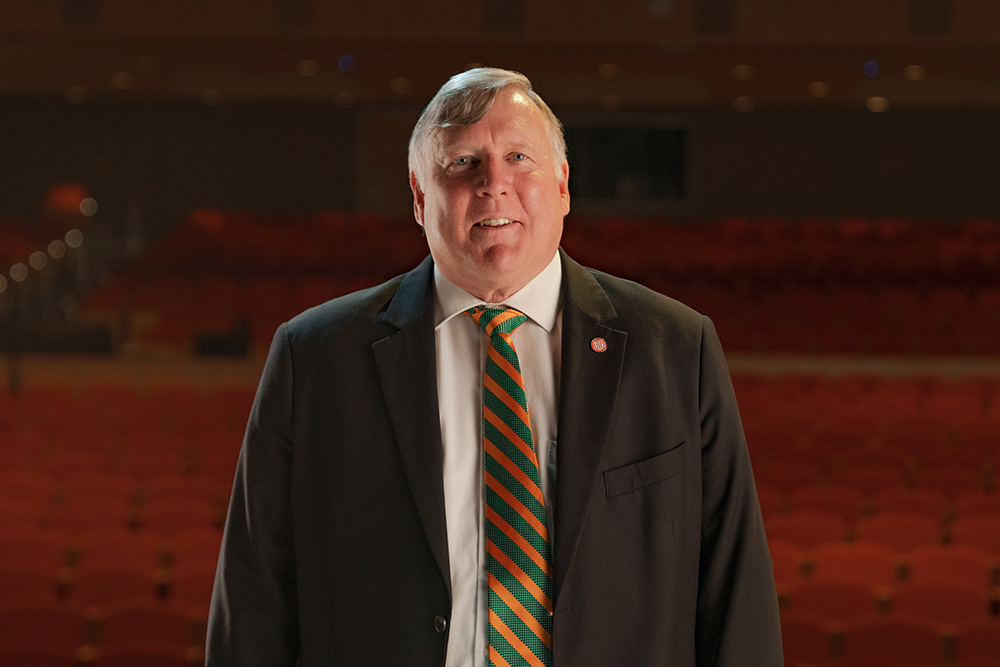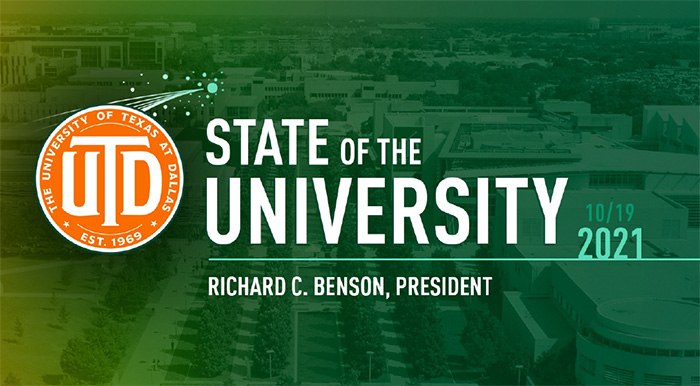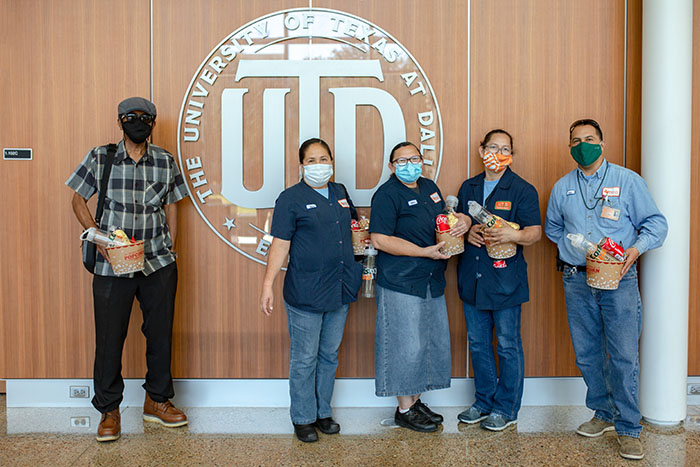Benson Praises Comets, Touts Progress at State of University Address
By: Stephen Fontenot | Oct. 29, 2021

The University of Texas at Dallas has resumed the trajectory that propelled it into the ranks of the nation’s premier research universities, President Richard C. Benson said in his annual State of the University address, during which he praised faculty, staff and students for remaining united in weathering the COVID-19 pandemic.
Benson, the Eugene McDermott Distinguished University Chair of Leadership, credited University employees — in particular, essential workers — with providing “a reassuring continuity to our operations” when the campus was closed for all but essential activities in 2020.
“You kept our buildings clean and our landscape beautiful; you prepared and served meals; you responded to our technology needs; you protected our campus; and you kept our students engaged and on track,” Benson said. “In these 18 months, we have all learned something about ourselves and about each other. Most of all, we learned something about what it means to be a part of this community. My gratitude for your efforts is boundless.”
Benson noted that the Strategic Plan published in 2018 has been expanded with a new initiative to foster diversity, equity and inclusion, and specific goals that are “applicable to every level of our organization and operations.”
“In these 18 months, we have all learned something about ourselves and about each other. Most of all, we learned something about what it means to be a part of this community. My gratitude for your efforts is boundless.”
UT Dallas President Richard C. Benson
He further affirmed the University’s commitment to a diversity of people, ideas and perspectives, citing the hiring of Dr. Yvette E. Pearson as the new vice president for diversity, equity and inclusion.
“We’ve responded to the greatest movement for social justice that I’ve seen since I was much younger,” Benson said.
Signs of Strength
UT Dallas’ growing endowment, which is now $769 million, is a point of pride for Benson, as are federal research expenditures, which have increased from $36 million in academic year 2017 to $58 million in academic year 2021.

Here are some key statistics that UT Dallas President Richard C. Benson highlighted during the State of the University:
Fall Enrollment: 29,698
Freshman Class: 217 National Merit Scholars
Federal Research Expenditures: $58.2 million
Endowment: $769 million
Read the rest of the highlights from the presentation (PDF).
“Good things are happening with federal research expenditures, which are the most competitive dollars we seek,” he said. “Throughout the worst of the pandemic, our research activity actually increased. We still had people coming into their labs, socially distanced but doing their work, getting it done, getting it published.”
He also pointed to the launch of the public phase of New Dimensions: The Campaign for UT Dallas as a catalyst for the University’s future. With $320 million already committed, the University is approaching the halfway mark toward its goal of $750 million.
Benson noted the University’s growing national standing as reflected in rankings like those produced by U.S. News & World Report, which ranks UT Dallas 64th among public universities nationwide and third best in Texas.
“We also saw significant gains in our undergraduate programs in business [41st overall], computer science [71st] and engineering [72nd],” he said.
Though the pandemic stalled the University’s momentum toward its goal of having 625 tenure-system faculty by academic year 2023, the number of such faculty — 565 — has remained steady over the past six years. The Strategic Plan target for first-time-in-college freshmen, however, has already been exceeded, with more than 4,000 new freshmen enrolled this fall. Overall, fall 2021 enrollment totaled 29,698 students. Undergraduate numbers have steadily climbed, while graduate student numbers increased for the first time in several years as the COVID-related dip in international enrollment abated.
“We have more students choosing UTD for doctoral studies, and we’re doing a good job to mentor them and to make sure that they are successful,” Benson said.

Benson also paid tribute to former provost and interim president Dr. Hobson Wildenthal, who died Sept. 4 at the age of 83, as “a singular figure in the University’s history” who, for nearly 30 years, devoted his time and efforts to making UT Dallas one of the best public research institutions in the nation.
“Dr. Wildenthal was a transformative leader and thoughtful colleague. He will be greatly missed, but his incredible legacy will extend for years to come,” Benson said.
Looking forward, Benson stated his belief that “our ability to adopt new practices where needed and to invest in programs that resonate with our students and in the community” would bring about ongoing success at UT Dallas.
“There can be no doubt that our mission at UT Dallas and in higher education remains essential to restoring prosperity and advancing our society,” he continued. “Higher education has always been a catalyst for change.”
Additional Speakers
Dr. Ravi Prakash, speaker of the faculty for the Academic Senate and professor of computer science, praised his colleagues and the University community for tackling the challenges of the past year but cautioned that “we are not out of the woods. The road to normalcy is long and arduous, and littered with disappointments.”
Nonetheless, he said, “As scholars and scientists, it isn’t enough just to create knowledge and teach in the classroom. We need to reach out to the much larger population that is outside our classrooms and laboratories. This is how we help knowledge and logic prevail. This is how we realize our founders’ visionary dream. This is how we serve all the human race.”
Other speakers in the State of the University program included Kara Peak, biomedical engineering doctoral student and president of the Graduate Student Assembly; Staff Council president Jennifer Klunk, program coordinator in mechanical engineering; and Student Government president Ryan Short, political science senior.
Each speaker’s video presentation is available on UT Dallas’ YouTube channel and the State of the University webpage, as is a review of quantitative targets.
Media Contact:
Stephen Fontenot, UT Dallas, 972-883-4405, stephen.fontenot@utdallas.edu, or the Office of Media Relations, UT Dallas, (972) 883-2155, newscenter@utdallas.edu.





